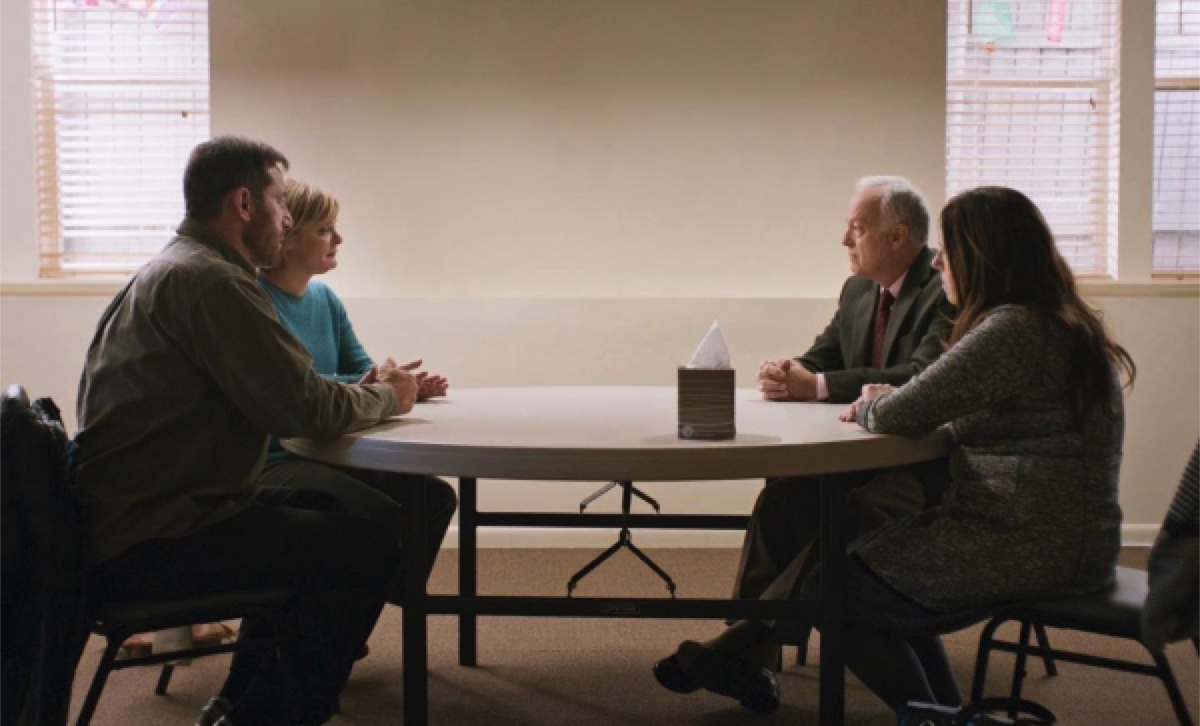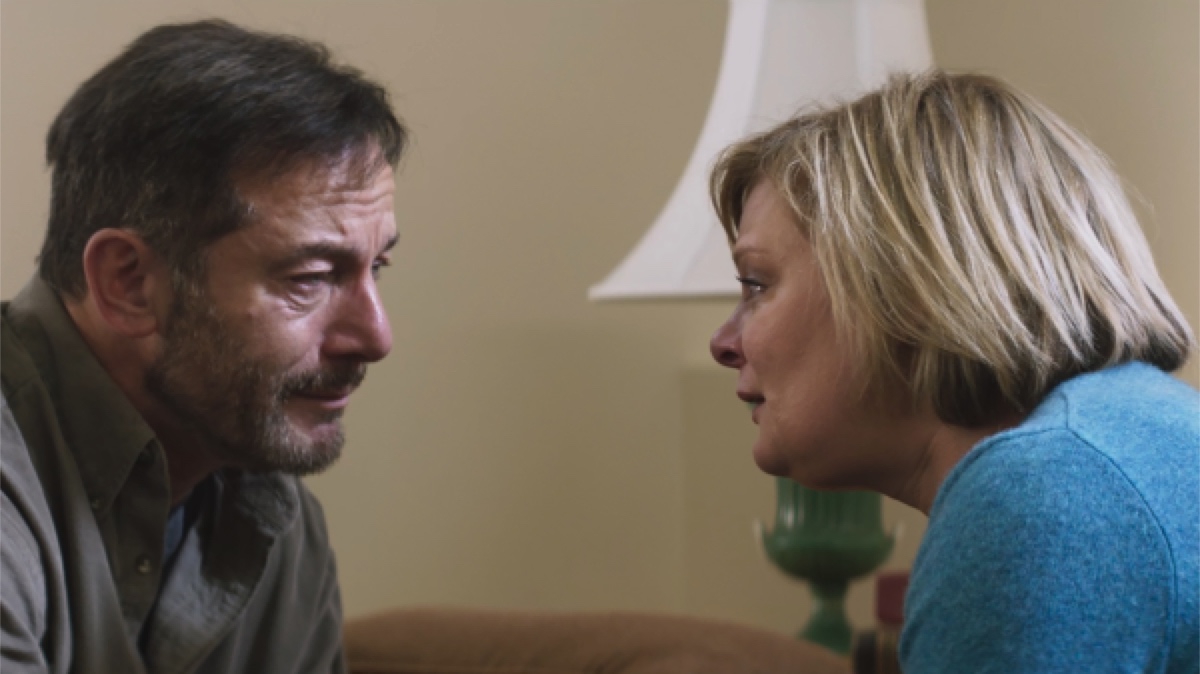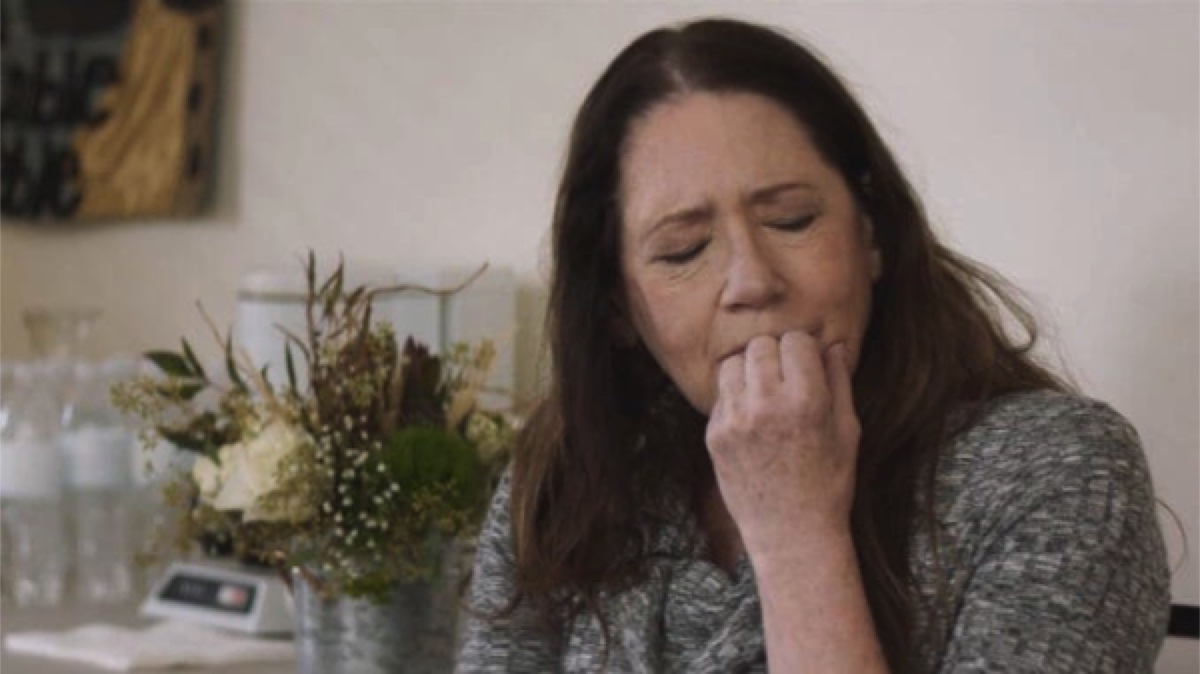Actor-turned-writer/director, Fran Kranz, tackles a tough subject in his feature film debut, "Mass." The emotional aftermath of a school shooting for family members left behind seems like an unusual plot for a film, but Kranz hits all the right notes in this understated but realistic portrayal of two couples struggling to come to terms with what happened at their sons' school six years previous.
The way Kranz feeds the audience information in little bits and bites makes one feel like a fly-on-the-wall, witness to an intense moment in the lives of the four people in the room at a small-town Episcopal church. Before they arrive, though, church employee, Judy (Breeda Wool) meticulously oversees every minute detail for this mysterious gathering and, somewhat anxiously arranges snacks, a table and chairs, fussing over everything, as if she was preparing for a meeting full of VIP's. Then, social worker, Kendra (Michelle N. Carter), comes into the mostly unadorned room to make sure it's appropriate for the solemn meeting.
First to arrive is Jay (Jason Isaacs) and Gail (Martha Plimpton). When they are joined by Richard (Reed Birney) and Linda (Ann Dowd), awkward pleasantries are exchanged. It's not until a third of the way into the film that the audience is clued in on why these four people have gathered, when Gail answers Linda's question: "Why do I want to know about your son? Because he killed mine."

Jason Isaacs, Martha Plimpton, Reed Birney, and Ann Dowd in "Mass." © 2021 Bleecker Street Media. All Rights Reserved.
The exchange these four parents have throughout the course of the film embodies the feelings and questions we all have in the face of tragic events: why? who's to blame? how do we stop it happening in the future? what do we do now? how do individuals find healing? What makes "Mass" so compelling is that each person has responded to the tragedy in very different ways and the time has come for them to talk everything out in a safe environment.
We're shown that Jay and Gail, and Richard and Linda know each other, even if on a superficial level, and have even exchanged some written correspondence over the past six years since the shooting. They each know all the details of the event and the aftermath that played out in the media. Emotionally, however, each of the four comes to the table from a different head and heart space.

Jason Isaacs as Jay and Martha Plimpton as Gail in "Mass." © 2021 Bleecker Street Media. All Rights Reserved.
The ebb and flow of conversation and the ups and downs of the emotions evoked pays tribute to the talent of the character actors cast for "Mass." It also speaks volumes about the talented first-time director, who skillfully choreographs the figurative and literal movement of people, symbols, and hearts. Pay attention when awards season rolls around because this film will create plenty of buzz. Isaacs and Plimpton, as the parents of one of the victims, show how unresolved grief can take over one's soul. Birney's character of Richard seems like he's above it all but looks can be deceiving. But it's Ann Dowd's performance that captures the audience with her undeterred but baffling (even to herself) conviction that, yes, she raised a murderer but, as a mother, she still loves her son.
I wondered why Kranz chose to title his film, "Mass." It's well known that the Catholic celebration of Eucharist is often called Mass, but I didn't know that Episcopalians sometimes refer to their worship service as Mass as well. What happens at Mass? We meet Jesus Christ. We listen to his Word in the Scriptures. We open ourselves to whatever God has in store for us and pray for the ability to do God's will. We experience his healing power. We receive his Body and Blood in Eucharist.

Ann Dowd as Linda in "Mass." © 2021 Bleecker Street Media. All Rights Reserved.
Catholic theology talks about four "real presences" of Christ in the celebration of the Eucharist. The most obvious one is in Holy Communion. The other three ways Christ is truly present is 1. in the Scriptures proclaimed, 2. in the person of the priest, and 3. in the gathered assembly. The last one might surprise some people but it's true that in the gathered assembly at Mass, there to worship God, Christ is truly and really present.
"Mass" doesn't frame the meeting between the two couples in any religious sense, other than it's church setting, but by calling the movie "Mass," Kranz implies that God was in that room with God's power and healing, present, not in the same way as in the Eucharistic Celebration, but present nonetheless in the suffering, confusion, anger, anguish, doubting, blaming, listening, openness, and forgiveness of its four protagonists.
God willing, we'll never have to face the emotional devastation these fictional parents went through, but we all have some kind of suffering in our lives. Perhaps the drama of "Mass" will help us to understand that the road to recovery includes speaking our feelings, listening to others, and being open to God's healing presence in our lives.
About the Author
Sister Hosea Rupprecht is a member of the Daughters of St. Paul, a religious community dedicated to evangelization with the media. She holds a Master of Theological Studies degree from the University of St. Michael’s College in Toronto and an MA in Media Literacy from Webster University in St. Louis.
Sr. Hosea is director of the East Coast office of the Pauline Center for Media Studies, based in Staten Island, NY, and speaks on media literacy and faith to catechists, parents, youth, and young adults. Together with Father Chip Hines, she is the co-host of Searchlight, a Catholic movie review show on Catholic TV. Sr. Hosea is the author of How to Watch Movies with Kids: A Values-Based Strategy, released by Pauline Books & Media.
For the past 15 years, she has facilitated various film dialogues for both children and adults, as well as given presentations on integrating culture, faith and media.